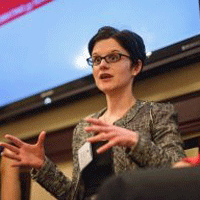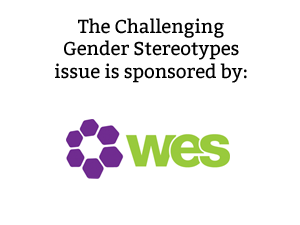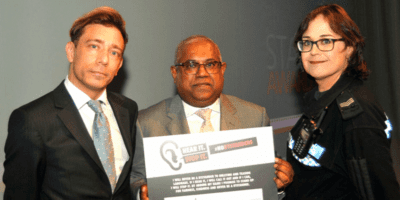Colleen Ammerman is the Director of Program Administration for the Gender Initiative at Harvard Business School (HBS). The Gender Initiative was launched in 2015 to support research, education, and knowledge dissemination to accelerate the advancement of women leaders and promotes gender equity in business and society. Inspiration for the Gender Initiative emerged during the 2013 commemoration of the School’s 50th anniversary of admitting women to its two-year MBA programme.

“…a key thing to understand is that there is not a one-size-fits-all solution. Today, especially in the US and Europe, discrimination and stereotyping tend to happen in less overt, explicit ways than in the past…”
What does your role involve on a day to day basis?

As director of the HBS Gender Initiative, I work with our faculty affiliates (30 faculties from across HBS are engaged in the Initiative community) and with various departments across the School to catalyse and disseminate research; support case-writing and course development; and create opportunities to bring insights generated at HBS to organisational leaders.
Every day is a bit different, but I am always working with colleagues to develop communications and events, foster community within and beyond HBS, and strategise about how to use our platform to move the conversation about gender and work forward.
Please can you tell us more about the Harvard Business School Gender Initiative and why it was established?
The Gender Initiative launched in spring 2015. We support research, education, and knowledge dissemination to accelerate the advancement of women leaders, as well as promoting gender equity in business and society. The Initiative is designed to bring together faculty working in this domain and leverage the research they are doing to enhance its impact. The Initiative structure provides a platform for connecting HBS faculty to one another and to scholars, practitioners, and companies beyond the School.
Would you be able to talk us through the research that was carried out last year into working mothers?
My colleague, Professor Kathleen McGinn’s research on working mothers analysed data from the International Social Survey Programme, which surveyed randomly-selected and nationally representative samples of women and men in 25 countries in Central and South America, Europe, Asia and the Middle East.

What were the findings and how did they challenge gender stereotypes?
My colleague and her co-authors found that having had a mother who worked was related to a number of positive outcomes, challenging the notion that working mothers do a disservice to their children. To the contrary, the research revealed that having had a working mother was related to higher rates of employment and earnings and more supervisory responsibility for women, and to spending more time on family care and on housework for men.
I’ve often heard my colleague talk about this as “closing the gender gap on both ends,” which I think is a great way to put it. Unfortunately, in many societies working moms are still judged negatively, and I hope these findings have helped them to feel less anxiety or guilt.
In your experience, what it the most effective way to reduce gender stereotyping in the workplace?
I think a key thing to understand is that there is not a one-size-fits-all solution. Today, especially in the US and Europe, discrimination and stereotyping tend to happen in less overt, explicit ways than in the past. The faculty chair of the Gender Initiative, Robin Ely, has written about second-generation gender bias – the more subtle ways that women are systematically disadvantaged.
To combat this kind of bias, leaders and managers first need to understand what it is and learn to identify it, and commit to implementing cultural changes within their teams and organisations. (The linked article has some great insights about how to do so.)
Is the attitude of the next generation of Millennial women as concerned about conforming to stereotypes?

I think much remains to be seen about the Millennial generation, who are still at an early stage in their lives and careers. From my conversations with women MBA students and recent graduates, my sense is that they are aware of the barriers they may encounter over the course of their careers and looking for insights into how to navigate them.
In recent years, an MBA elective course created by another Gender Initiative affiliate, Professor Boris Groysberg, has focused on equipping students for that challenge. In addition, his course, How Star Women Succeed, also teaches both men and women students how to be inclusive leaders and managers. I also frequently hear from young professional women within and beyond HBS who are eager to be change agents in their organisations and in society, which I find inspiring.
What is coming up next for you and the Harvard Business School Gender Initiative?
A number of exciting things are in the pipeline. Our new website is scheduled to launch in October. We will be releasing new results from our Life and Leadership After HBS study of alumni career and life outcomes throughout the course of this year and next year.
We are hosting several research and alumni convenings in the spring, and a new Women on Boards Executive Education programme will welcome its first cohort of participants this coming November. We also hope to share more faculty research with the media as new findings – on topics like the gender gap in executive compensation and the experiences of HBS alumnae of colour – as they become available.
http://www.hbs.edu/faculty/initiatives/Pages/gender-initiative.aspx
https://twitter.com/colleenammerman






